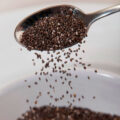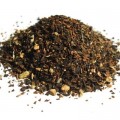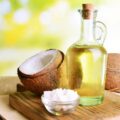
Marie A.C. | Flickr
Are you actually familiar with all the health benefits of sunflower seeds, though, or do you just eat them because you’ve heard that they are healthy? Sunflower seeds are really quite amazing. They are absolutely packed with nutrition, and they can improve many different aspects of your health.
Nutritional Content
Sunflower seeds contain a tremendous amount of vitamin E: 61.5% of your daily required value. They also contain a fair amount of vitamin B1, manganese, copper, magnesium, vitamin B6, phosphorous, and several other key nutrients. These nutrients provide your body with a number of benefits. Let’s take a look at what sunflower seeds can do for you by discussing each of these nutrients in detail.
Vitamin E Benefits
Vitamin E is very important for your body, but most of us don’t get enough of it. If you have arthritis or other inflammatory issues, eating more vitamin E can help you reduce your symptoms. Sunflower seeds are an excellent snack as part of an anti-inflammatory diet. Vitamin E neutralizes free radicals and helps your skin, organs, and other tissues to stay healthy. This is one reason that vitamin E is included in many beauty products, including soaps and shampoos. Vitamin E can help to keep your skin looking fresh, and may have an anti-aging effect on your appearance. It can also strengthen your hair and protect it from damage.
Studies have demonstrated that a healthy vitamin E intake can help reduce your risk of developing colon cancer or cardiovascular disease. Vitamin E is able to stop free radicals from oxidizing cholesterol, which prevents blockage in your arteries (only oxidized cholesterol sticks to the walls of your blood vessels). Finally, one more benefit of vitamin E is the reduction of hot flashes during menopause.
Benefits of Phytosterols
There are chemical compounds found inside sunflower seeds called phytosterols. Interestingly enough, these chemicals are similar to cholesterol in their structure, yet they are able to reduce the amount of cholesterol in your blood. By reducing your cholesterol, phytosterols add to the cardiovascular benefit of sunflower seeds, and they may also protect you against certain forms of cancer.
Magnesium’s Many Benefits
Magnesium is present in high levels in sunflower seeds. This is yet another nutrient that many people do not get enough of. A healthier intake of magnesium can have many different advantages for your health. If you are an asthma sufferer, your symptoms could decline, and if you have high blood pressure, it might go down. People with migraines sometimes experience improvements with magnesium, and it can also be helpful for women with PMS. PMS is often accompanied by migraines and muscle spasms, and the nerves can easily be overactivated. Magnesium can offset some of those effects.
Magnesium additionally supports the growth of healthy bones, and can boost your energy levels and combat lethargy. At the same time, magnesium helps to relax nerves by serving as a calcium channel blocker. This keeps your nerves from overactivating, which prevents a number of different issues, including high blood pressure, muscle spasms, and migraines.
Selenium Benefits
Selenium is not the most well known nutrient, but it is very important. Studies have demonstrated that cancer may result from insufficient selenium intake. Selenium can slow or halt the spread of cancerous cells, as well as create and repair damaged non-cancerous cells in your body. Selenium also has an important connection to proteins which protect your body from carcinogenic toxins.
So next time you are at the supermarket, check the healthy snack aisle to see if you can find a bag of sunflower seeds. They are generally quite affordable, and may be sold shelled or unshelled. You can save even more money by buying them in bulk. If you buy them inside their shells, check the status of the shells to ensure that they are not dirty and are unbroken. Seeds should be firm to the touch. If the seeds are already out of their shells, they should not be yellow. Yellow seeds have already gone bad. When you store sunflower seeds in your home, keep them sealed, and consider putting them in the freezer. They can go stale quite quickly if you do not take steps to preserve them.












Leave a Reply